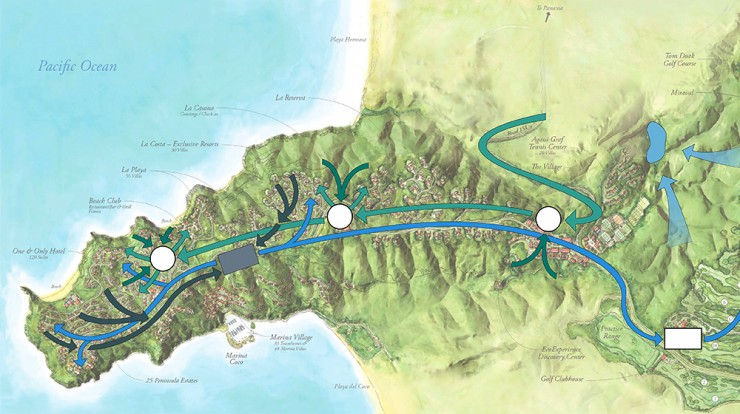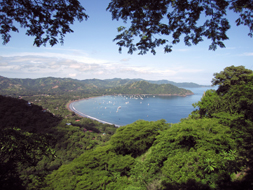

Project Profiles
Cacique Resort
Chris Garvin
Share
Learn more about our environmental strategy work and services by emailing us at [email protected]. Follow the conversation on twitter: @TerrapinBG.
Located on the northwest coast of Costa Rica, Cacique is a 686 acre site that will be developed into a series of world class, destination eco-resorts and residences. The site will include two five-star resorts, exclusive residences, and a town center, as well as eco-adventure programming and resort activities. With the intention of making Cacique a forward-thinking example of sustainable development, the project’s developer and master planner asked Terrapin to help in identifying big-picture performance strategies. Our partners in the Environmental Opportunities Charrette were Lehr Consultants International, Natural Systems International, University of Pennsylvania, University for Peace (San Jose), Climate Mitigation Services, and Hart Howerton.
Following this charrette and a site visit, Terrapin was asked to author a set of Sustainable Design and Development Guidelines to direct the implementation of key project goals. Cacique is located in a tropical dry forest, a rare and unique ecosystem in which the climate changes so dramatically between seasons that the landscape is transformed from rainforest to near-desert conditions, and back again, each year. In addition, a good deal of the site has been heavily impacted by human development. For this reason, a major component of the project involves restoring and highlighting the local ecosystem by using native species to create an experiential, site-specific landscape. With the help of two experts in tropical dry forest ecology, the landscape design team reviewed appropriate species that would highlight the native palette – preserving and restoring endangered populations – and require no irrigation during the “golden” season. Since the aquifers adjoin the site are threatened, the team rethought the originally proposed conventional water infrastructure to include storm and wastewater management initiatives along with the use of modular, building-scale biological wastewater processing units to reduce water use by 53%, reduce infrastructure construction costs, and allow drinking quality reclaimed water to be used to recharge the underlying aquifers. Additional focal points for the project include energy, and a dehumidification strategy that allows dramatic savings in building energy use.
Beyond its local impacts, the Cacique project also presents an opportunity to create a wider influence. Costa Rica has a national commitment to carbon neutrality; as a result, the project’s leading-edge infrastructural innovations should become a respected example of preferred development. Also, the developer initiated a social sustainability campaign to support local schools, improve the surrounding infrastructure, and improve the regional economy, demonstrating a model of ecotourism that shares social and economic benefits with the local community.
*Feature image courtesy of Chris Garvin
Filed under:
Chris Garvin
As a partner, Chris is an architect and sustainability leader focused on systemic thinking to address challenges in the built environment. Chris believes we can learn how to live on this planet if we start listening to nature again.
Topics
- Occupant Comfort
- Materials Science
- Speaking
- LEED
- Terrapin Team
- Phoebe
- Community Development
- Greenbuild
- Technology
- Biophilic Design Interactive
- Catie Ryan
- Spanish
- Hebrew
- French
- Portuguese
- Publications
- Carbon Neutrality
- Environmental Values
- Conference
- Psychoacoustics
- Education
- Workshop
- Mass Timber
- Transit
- Carbon Strategy
- connection with natural materials
- interior design
- inspirational hero
- biophilia
- economics of biophilia
- Sustainability
- Systems Integration
- Biophilic Design
- Commercial
- Net Zero
- Resorts & Hospitality
- Energy Utilization
- Water Management
- Corporations and Institutions
- Institutional
- Ecosystem Science
- Green Guidelines
- Profitability
- Climate Resiliency
- Health & Wellbeing
- Indoor Environmental Quality
- Building Performance
- Bioinspired Innovation
- Biodiversity
- Residential
- Master Planning
- Architects and Designers
- Developers and Building Owners
- Governments and NGOs
- Urban Design
- Product Development
- Original Research
- Manufacturing
- Industrial Ecology
- Resource Management
- Sustainability Plans
- Health Care



